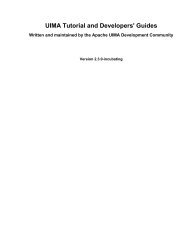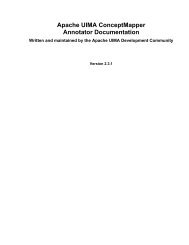Apache UIMA Ruta Guide and Reference - Apache UIMA - The ...
Apache UIMA Ruta Guide and Reference - Apache UIMA - The ...
Apache UIMA Ruta Guide and Reference - Apache UIMA - The ...
You also want an ePaper? Increase the reach of your titles
YUMPU automatically turns print PDFs into web optimized ePapers that Google loves.
descriptorPaths<br />
<strong>Ruta</strong> Engine<br />
This parameter specifies the possible locations for descriptors like analysis engines or type systems,<br />
similar to the parameter scriptPaths for the script files. A typical value for this parameter is for<br />
example "C:/<strong>Ruta</strong>/MyProject/descriptor/". <strong>The</strong> relative values of the parameter additionalEngines<br />
are resolved to these absolute locations. This parameter can contain multiple values, as the main<br />
script can refer to multiple projects similar to a class path in Java.<br />
resourcePaths<br />
This parameter specifies the possible locations of additional resources like word lists or CSV<br />
tables. <strong>The</strong> string values have to contain absolute locations, for example, "C:/<strong>Ruta</strong>/MyProject/<br />
resources/".<br />
additionalScripts<br />
<strong>The</strong> parameter additionalScripts is defined as a list of string values <strong>and</strong> contains script files,<br />
which are additionally loaded by the analysis engine. <strong>The</strong>se script files are specified by their<br />
complete namespace, exactly like the value of the parameter mainScript <strong>and</strong> can be refered to by<br />
language elements, e.g., by executing the containing rules. An exemplary value of this parameter is<br />
"org.apache.uima.SecondaryScript". In this example, the main script could import this script file by<br />
the declaration "SCRIPT org.apache.uima.SecondaryScript;" <strong>and</strong> then could execute it with the rule<br />
"Document{-> CALL(SecondaryScript)};".<br />
additionalEngines<br />
This parameter contains a list of additional analysis engines, which can be executed by the <strong>UIMA</strong><br />
<strong>Ruta</strong> rules. <strong>The</strong> single values are given by the name of the analysis engine with their complete<br />
namespace <strong>and</strong> have to be located relative to one value of the parameter descriptorPaths, the<br />
location where the analysis engine searches for the descriptor file. An example for one value of<br />
the parameter is "utils.HtmlAnnotator", which points to the descriptor "HtmlAnnotator.xml" in the<br />
folder "utils".<br />
additionalEngineLoaders<br />
<strong>The</strong> parameter "additionalEngineLoaders" specifies a list of optional implementations of the<br />
interface "org.apache.uima.ruta.extensions.IEngineLoader", which can be used to applicationspecific<br />
configurations of additional analysis engines.<br />
additionalExtensions<br />
This parameter specifies optional extensions of the <strong>UIMA</strong> <strong>Ruta</strong> language. <strong>The</strong> elements of the<br />
string list have to implement the interface "org.apache.uima.ruta.extensions.I<strong>Ruta</strong>Extension". With<br />
these extensions, application-specific conditions <strong>and</strong> actions can be added to the set of provided<br />
ones.<br />
reloadScript<br />
This boolean parameter indicates whether the script or resource files should be reloaded when<br />
processing a CAS. <strong>The</strong> default value is set to false. In this case, the script files are loaded when the<br />
analysis engine is initialized. If script files or resource files are extended, e.g., a dictionary is filled<br />
yet when a collection of documents are processed, then the parameter is needed to be set to true in<br />
order to include the changes.<br />
<strong>UIMA</strong> <strong>Ruta</strong> Version 2.0.1 <strong>Apache</strong> <strong>UIMA</strong> <strong>Ruta</strong> Overview 13




